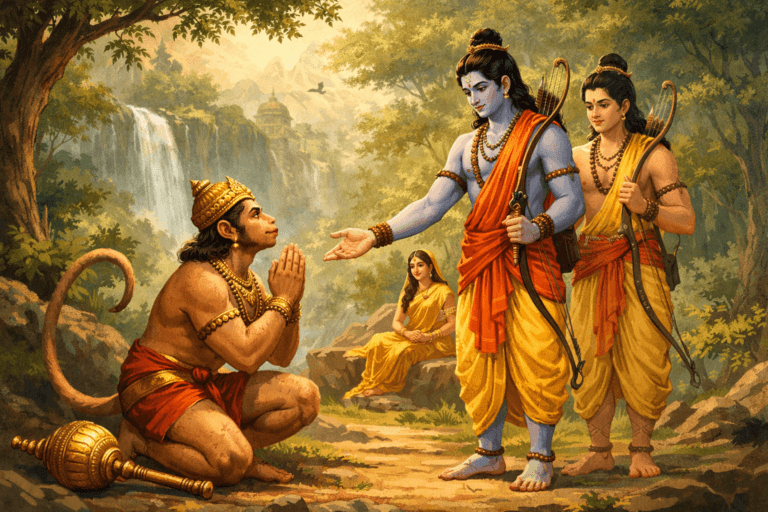Introduction
The enigmatic figure of Hanuman, the valiant monkey god renowned for his strength, devotion, and unwavering loyalty in the Hindu epic Ramayana, has captivated hearts for centuries. But amidst his numerous accolades and mythical feats, a question often arises: who is the father of Hanuman?
While seemingly straightforward, this inquiry delves into the intricate tapestry of Hindu mythology, revealing diverse interpretations and layers of symbolism. To truly understand Hanuman’s paternity, we must embark on a journey through various scriptures, legends, and interpretations.
The Conventional Answer: Kesari, the Vanara King
According to the most widely accepted narrative, Hanuman’s biological father is Kesari, a powerful vanara (monkey) king. Kesari, known for his bravery and wisdom, ruled over the kingdom of Kishkindha. He married Anjana, a celestial apsara who was cursed to take the form of a vanara. Their union resulted in the birth of Hanuman, who inherited his father’s strength and courage.
This version of Hanuman’s origin is found in the Ramayana, the epic poem that narrates the story of Rama and his devoted allies. It establishes Kesari as a central figure in Hanuman’s life, shaping his values and instilling in him the qualities of a warrior and a leader.
The Divine Intervention: Vayu, the Wind God
Another significant aspect of Hanuman’s legend involves Vayu, the majestic wind god. In some versions, Vayu is said to have played a crucial role in Hanuman’s birth. As Anjana prayed for a son blessed with immense strength and agility, Vayu blessed her, leading to the birth of Hanuman. Hanuman’s extraordinary powers, such as his ability to fly and travel vast distances at incredible speeds, often attribute to his connection with Vayu.
The Incarnation of Shiva: A Celestial Connection
Adding another layer to the mystery, some interpretations suggest Hanuman as an incarnation of Lord Shiva, the supreme deity of destruction and transformation. This perspective emphasizes Hanuman’s immense strength, unwavering resolve, and fierce devotion to righteousness, qualities mirroring Shiva’s divine attributes.
This connection finds support in certain texts like the Hanuman Chalisa, a devotional hymn dedicated to the deity. It explicitly states Hanuman as the eleventh incarnation of Lord Shiva, highlighting his celestial lineage and divine purpose.
Exploring the Symbolism: Beyond Biological Paternity
While delving into the biological father of Hanuman is intriguing, it’s crucial to recognize the deeper symbolic significance attached to each figure. Each association imbues Hanuman with unique qualities and reinforces his multifaceted personality.
- Kesari: Representing earthly lineage and leadership, Kesari embodies Hanuman’s strength, courage, and loyalty.
- Vayu: Symbolizing boundless energy and dynamism, Vayu reflects Hanuman’s swiftness, agility, and power of movement.
- Shiva: Highlighting divine essence and connection to the ultimate source, Shiva emphasizes Hanuman’s spiritual power, wisdom, and unwavering devotion.
Therefore, understanding the “father” of Hanuman goes beyond merely identifying a biological parent. It’s about acknowledging the diverse influences that shaped his character, both earthly and divine, forging the legendary figure we know and revere today.
Conclusion:
Unveiling the father figure of Hanuman is a journey through layers of mythology, unveiling the diverse influences that shaped the legendary vanara god. From the valiant Kesari to the powerful Vayu and the divine Shiva, each association enriches our understanding of Hanuman, emphasizing his multifaceted personality and timeless significance.
His story reminds us that true strength lies not only in physical prowess but also in unwavering devotion, spiritual wisdom, and unwavering commitment to righteousness.
FAQs:
A: Kesari is generally considered the biological father of Hanuman, as mentioned in the Ramayana.
A: While interpretations differ, Vayu’s role in Hanuman’s birth is symbolic, representing the god’s divine intervention and blessing Hanuman with specific powers.
A: Some interpretations view Hanuman as an incarnation of Shiva, highlighting his divine qualities and spiritual power.
A: Kesari represents earthly lineage, embodying strength, courage, and righteousness. Vayu symbolizes divine influence, granting Hanuman his exceptional abilities and connection to the life force. Shiva signifies his celestial lineage, highlighting his divine purpose and connection to the destroyer and transformer aspects of the universe.

